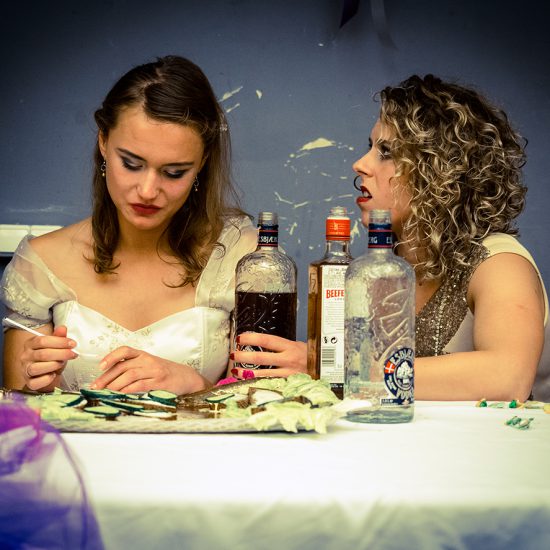Different poison
The drama of Verona transferred to pizzeria or how the cuisine of sensibilities should be reduced to good looking kneading-trough? (“Romeo and Juliet” by O. Korsunovas in France)
Maximum cabined space. The choke is unavoidable. That is the mood that overcomes when you are watching a version of “Romeo and Juliet” presented by Lithuanian director Oskaras Kor�unovas. Mutual grunge and desire for revenge are accumulating in each generation of Capulet and Montague families. They keep their hate high as if it was a torch.
A visual approach of director from post-soviet country is the following: broad communal kitchen that may be understood as typical pizzeria of Verona. It occupies almost all of the stage; only a small space is left for the cast. Kitchen tools and skeleton white casual housewares are gathered to dusty picture. In that picture we may also glimpse the randomly tucked bogies, head of swine, cross, ladle, coffin, rope, dress of the bride.
Perfect symmetry of two equal hates, two similar families, two identical fates. Everything is surrounded in dust which is accessory of the past that all the while pursues the present. By way of expressing authority of the past that squeezes the present, the dust is simulated by the flour. These dusts of the flour symbolize here both the time and the poison of crime that will murder the lovers. Even without deep acquaintance of metaphoricalness of all those things, on their ground we may see two clans that seek for nothing but a chance to roll themselves in the flour, that are blind of violence and don’t manage to leave the past out of consideration. All they can do is just nose after the pretexts for violence. And that’s quite easy thing to find.
The first scene: both families are posing for an invisible photographer. They both are stiffed in unnatural and funny postures… in short – they are like twins. Soon after that the confusion begins. The violent battle starts. We may guess that the sequence of this will be scoreless, and the death will welcome both sides equally. “Just started working with the play from the very beginning I considered the role of tradition. Namely the tradition that precisely knows what is good and what is wrong is the main subject of the play”. It seems, however, that Oskaras Korsunovas himself is not so sure about what is good and what is wrong any more.
Director doubts the main scenes of Shakespeare’s work. “One of the most important scenes in Romeo and Juliet is the scene of balcony. Traditionally it is represented in a romantic way.” Juliet of Korsunovas shakily balancing on the upper kitchen shelf realizes that “the world is much bigger than she has imagined. Until now she was blind, but suddenly she perceived that the same words may be addressed to the laws that rule her”.
The cauldron, in which bubbles the acts of revenge, betrayal, and knavery and which suddenly turns to the vessel of fatal poison, has a similar function. “When Juliet finds it, she realizes that all her former life was empoisoned with different poison: stereotypes and forehand attitudes. Namely the effect of that kind of poison is trampled by all characters in the narrow space filled with the stuffy steam. The kitchen here is an archetype. It somewhat recalls the Christian prayer Our Father – ‘give us our daily bread’. Everyday request for the same bread finally turns to death, for it supposes the dependence. It’s no longer a food. It’s poison”. Obviously, the kitchen of sensibilities is special –you won’t find here any recipe; the consistence of here prepared elixirs all time will remain doubtful or even harmful. Thank you, Oskaras, for reminding this…
Tr. by Gediminas Pulokas



